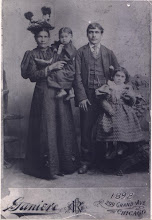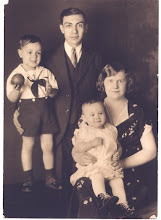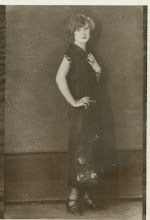Dec 29:
Today we’re on the road driving home from Southern California and (rather than do my Italian homework), I thought I’d try to explain what I know so far.
My sister wrote back yesterday saying… what do you mean… “We are Lucanii? I thought they were from Calvello.” She could have easily said… what do you mean, I thought we were Italian? Frankly, our great grandparents probably never thought of themselves as Italian… at least until they got on that boat to come to “merica”. I’m sure they simply related to the world as Calvellesi, with the spirit of campanilismo (“within the range of the bell tower”). It was a spirit of us against them that all everyone on the Italian peninsula felt towards their paese (town). In Northern Italy we hear about the ‘city-states” of Florence or Venice, Milan, Genoa, etc. Those were very powerful towns with a lot of money and influence in Europe, and, of course, immensely powerful people like the Medici. In Southern Italy, it was quite different.
I guarantee that if you don’t like history, you shouldn’t read this blog. Unlike American history where we only have to remember a couple of hundred years of events, (all documented in writing), this stuff is complex and dry. But here goes:
South of Rome there are a couple of main regions: Campania (Naples area), Calabria (the toe), Puglia (the heel), Sicilia (the island off the toe) and Basilicata (the instep).
Per Wikipedia:
The region was originally known as Lucania named for the Lucani (Lucanians) tribe, who were the first known settlers. Their name was derived from lucus, Latin for forest. Samnite tribes also inhabited the area before the Greeks invaded in the 7th century BC. The Greeks established settlements at Siris Metaponto and Heraclea making the region part of the wider Magna Grecia, They also developed basic agriculture and started trading.
The Romans pushed into Lucania as part of the expansion of their empire and by the 2nd century BC the area was under Roman rule. The Romans were the first to exploit the massive forests of the region, a process which continued for centuries and nearly exhausted this natural resource. The clearing of the forest led to swamps which led to malaria, a disease only conquered in the mid 1900’s.
The Byzantines followed the Romans and it was from them that the region was named Basilicata, (from basilikos "imperial").
(So if its Basilicata, why do I say we’re Lucani? Apparently the residents still prefer the original name. In 1860, after Italy was reunited, the Lucanians tried to have the region’s name changed back to Lucania instead of Basilicata. People who live there still call themselves Lucani and sort of cringe when you say Basilicata.)
(So if its Basilicata, why do I say we’re Lucani? Apparently the residents still prefer the original name. In 1860, after Italy was reunited, the Lucanians tried to have the region’s name changed back to Lucania instead of Basilicata. People who live there still call themselves Lucani and sort of cringe when you say Basilicata.)
In the following centuries the Normans and Swabians also invaded Basilicata. The Normans chose Calvello as a spot to build a castle for fortification. No “noble” ever lived there, but the castle was as a base of operations and as a stopping point along the way to the coast and the valley. The city/region of Calvello was granted to various nobility, over time, depending on who was king; but, for some reason, much of the land was owned by native Calvellesi rather than feudal lords. Still there were heavy taxes and fees to be paid in Calvello. However, in most of the South, the 13th century Anjou domination led to the establishment of a feudal system which hampered any hopes of an economic recovery for the region, which remained in abject poverty. Angevin rule transferred to the Spanish house of Bourbon and Spain ruled The Kingdom of Naples, also called the Kingdom of the Two Sicilies (so are we Sicilian asks my niece Stephanie? No we are Lucani).
At this point, I get very confused because there were numerous Charles and Ferdinands in the Spanish Bourbons… sometimes the same person was renamed as he inherited the throne and then again when given more territory. Not to mention the marriage to cousins who had no children so other nephews adopted and then new marriages to new cousins. But the Spanish Bourbons were harsh rulers who’s actual power came from their cousins, the Austrian Bourbons. If there was ever any trouble, in came the Austrians.
Did you know Homer was from Basilicata/Lucania? (I think close to Potenza). And Spartacus was a slave from the mountains of Lucania. Much of the reason that the town of Calvello was settled, high on a mountain top was for protection against being captured and enslaved.
Greeks strongly influenced the southern peninsula and the Greek Orthodox religion was at one time stronger than Roman Catholicism. Somewhere in there the Saracens also conquered parts of the south. From across the Adriatic, the Albanians immigrated to Italy; probably starting as “migrant workers” and eventually settling towns that still speak Albanian today. Hmm, maybe we’re Albanian?
The dialect in Calvello is closer to the dialect in Naples than to the dialect of the nearby town of Greek town of Anzi. However, there are greek words in the dialect. For example, the name for donkey in Calvellesi dialect is the same as the Greek word which means “stop”. There was a neighborhood in Calvello in the 1700-1800’s that actually spoke a totally different dialect from the main town and those who lived there didn’t associate much with the rest of the town. I don’t know if they were speaking “Anzi/Greek” or an Albanese dialect, but it was different enough that the main townspeople ostrasized them. No one has ever done archeological digs in Calvello but there have been Greek pottery shreds found in the town. (So are we Greek then? No, noi siamo Lucani).
Around 1796, after about 300 years of Bourbon rule, Napoleon conquered the peninsula and united Italy for the first time. A republic was created with the first constitution. And that’s when it all starts to get really interesting and bizarre. With secret societies, brigands, Garibaldi… I promise you, I’ve been trying to figure out the motivation of the Italian political sects of the 1800’s for a year now. I have some interesting stories specific to Calvello and about two De/DiGrazias to relate. Hopefully you all will come back to hear what happened next.






No comments:
Post a Comment